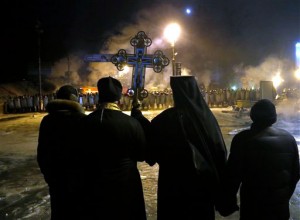
Orthodox priests pray as they stand between pro-European Union activists and police lines in central Kiev, Ukraine, Friday. AP
KIEV, Ukraine — Overnight talks between opposition leaders and the embattled Ukrainian president paused Friday morning as a shaky peace reigned in the protest camps in downtown Kiev after days of fighting left more than 100 people dead.
President Viktor Yanukovych, who was engaged in talks with opposition leaders and foreign officials, was “going to make concessions in order to restore peace,” Interfax Ukraine quoted his spokeswoman Anna German as saying. Interfax quoted the head of the European Union delegation in Ukraine, Yan Tombinsky, as saying they would meet with Yanukovych again before lunch.
Support for the president appeared to be weakening, as reports said the army’s deputy chief of staff, Yury Dumansky, was resigning in “disagreement with the politics of pulling the armed forces into an internal civil conflict.” Late on Thursday, the Ukrainian parliament passed a measure that would prohibit an “anti-terrorist operation” threatened by Yanukovych to restore order, and called for all Interior Ministry troops to return to their bases.
But it was unclear how binding the move would be, as the mechanism for carrying it out would have to be developed by the president’s office and the Interior Ministry.
On Friday morning, several thousand protesters milled around Independence Square, known as the Maidan, which earlier this week was rocked by street battles between protesters and police.
No visible police forces remained on the square, and volunteers walked freely to the protest camps to donate food and other packages.
Yanukovych and the opposition protesters are locked in a battle over the identity of Ukraine, a nation of 46 million that has divided loyalties between Russia and the West. Parts of the country — mostly in its western cities — are in open revolt against Yanukovych’s central government, while many in eastern Ukraine back the president and favor strong ties with Russia, their former Soviet ruler.
Protesters across the country are also upset over corruption in Ukraine, the lack of democratic rights and the country’s ailing economy, which just barely avoided bankruptcy with a $15 billion aid infusion from Russia.
In Brussels, the 28-nation European Union decided in an emergency meeting Thursday to impose sanctions against those behind the violence in Ukraine, including a travel ban and an asset freeze against some government officials.
The White House said U.S. Vice President Joe Biden spoke by telephone with Yanukovych on Thursday afternoon and made clear that the U.S. is prepared to sanction those officials responsible for the violence.
Despite the violence, defiant protesters seemed determined to continue their push for Yanukovych’s resignation and early presidential and parliamentary elections.
“The price of freedom is too high. But Ukrainians are paying it,” Viktor Danilyuk, a 30-year-old protester, said Thursday. “We have no choice. The government isn’t hearing us.”
Thursday was the deadliest day yet at the sprawling protest camp in Kiev. Snipers were seen shooting at protesters there, and video footage showed at least one sniper wearing a Ukraine riot police uniform.
One of the wounded, volunteer medic Olesya Zhukovskaya, sent out a brief Twitter message — “I’m dying” — after she was shot in the neck. Dr. Oleh Musiy, the medical coordinator for the protesters, said she was in serious condition after undergoing surgery.
Musiy told The Associated Press that at least 70 protesters were killed Thursday and over 500 were wounded in the clashes.
In addition, three policemen were killed Thursday and 28 suffered gunshot wounds, Interior Ministry spokesman Serhiy Burlakov told the AP.
A statement on the website of the Health Ministry said 77 people had been killed between Tuesday morning, when the violence began, and Friday morning. The statement said 577 people had been wounded and 369 hospitalized.
There was no way to immediately verify any of the death tolls.
French Foreign Minister Laurent Fabius, along with his German and Polish counterparts, said after a five-hour meeting with Yanukovych and another with opposition leaders that they discussed new elections and a new government, but gave no details. The three resumed meeting with Yanukovych late Thursday.
“For now, there are no results,” said an opposition leader, Vitali Klitschko.
Video footage on Ukrainian television showed shocking scenes Thursday of protesters being cut down by gunfire, lying on the pavement as comrades rushed to their aid.
Protesters were also seen leading policemen, their hands held high, around the sprawling protest camp in central Kiev. The Interior Ministry said 67 police were captured in all. An opposition lawmaker said they were being held in Kiev’s occupied city hall.
German Chancellor Angela Merkel spoke with Russia’s President Vladimir Putin and President Barack Obama about the crisis Thursday evening. All three leaders agreed that a political solution needs to be found as soon as possible to prevent further bloodshed.
Saying the U.S. was outraged by the violence, Obama urged Yanukovych in a statement to withdraw his forces from downtown Kiev immediately. He also said Ukraine should respect the right of protest and that protesters must be peaceful.
The U.S. State Department on Thursday issued a statement warning citizens “to defer all non-essential travel to Ukraine due to the ongoing political unrest.”
The Kremlin issued a statement with Putin blaming radical protesters and voicing “extreme concern about the escalation of armed confrontation in Ukraine.”
The Russian leader called for an immediate end to bloodshed and for steps “to stabilize the situation and stop extremist and terrorist actions.” He also sent former Russian ombudsman Vladimir Lukin to Ukraine to act as a mediator.
Russia appeared increasingly frustrated with Yanukovych’s inability to find a way out of the crisis.
Prime Minister Dmitry Medvedev said Russia will “try to do our best” to fulfill its financial obligations to Ukraine, but indicated Moscow would hold back on further bailout installments until the crisis is resolved.
“We need partners that are in good shape and a Ukrainian government that is legitimate and effective,” he said.